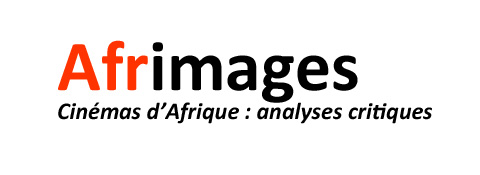Invited by the 14th International Film Festival Cinémas d’Afrique in Lausanne (2019, Switzerland) to discuss the impact and importance of music in film aesthetics, singer-songwriter Wasis Diop, and directors Joël Karekezi (The Mercy of the Jungle) and Peter Sedufia (Keteke) explored this rarely discussed theme using excerpts from their films, accompanied by producer Pedro Pimenta and director Michel K. Zongo. The round table was moderated by Alex Moussa Sawadogo, artistic advisor of the festival, and Olivier Barlet. (text in french published on the Africultures website.)
Olivier Barlet, following the screening of two excerpts from Hyenas – These excerpts inspire two different experiences. On the one hand, a musical illustration in contrast to what is happening in the image, and on the other hand, the principal theme that comes back in various arrangements throughout the film. The first excerpt depicts a repetitive clinking. The repetition in film scores tends to support the tension caused by the action, but here it is more in contrast. The rhythm does not match the screen. Why?
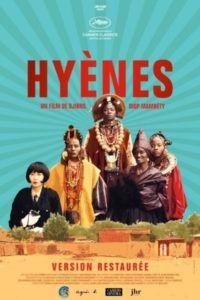 Wasis Diop – What American filmmakers have understood, and in a way the Europeans as well, is that a musician in a film is an author in his own right. That is to say that when you are called to work on a film, it is not to fill in, it is really to blend in between the lines. One time, in a festival in Hergla, Tunisia, Olivia had told me that Africa was the fool of the world. It’s a sentence that made a big impression on me. He doesn’t know to what extent he had touched something important in me. I believe we need to recreate things. I try to be like that, be a little crazy, because we need to shake things up. I wouldn’t know how to answer your question because I do things without knowing I do them. It’s an instinct, an inspiration, that is to say that it’s what I think needs to be done. I used to work with my older brother, Djibril, who was almost my twin, he was one of the only directors who let me do whatever I wanted to do. It was a bond of trust. We spoke the same language, had the same manner of seeing things, it made things easier. They made an album out of the Hyenas film score and it came out everywhere, including in the United States. Journalists do not know I made this album spontaneously. I used memories of my childhood and what I had heard in Africa. I didn’t come out of a school, but rather the streets of Dakar. What I did, it came from roaming the streets of Dakar. What I heard there, that’s what I put in the films. I don’t know what I’m doing, but I’m doing it anyway!
Wasis Diop – What American filmmakers have understood, and in a way the Europeans as well, is that a musician in a film is an author in his own right. That is to say that when you are called to work on a film, it is not to fill in, it is really to blend in between the lines. One time, in a festival in Hergla, Tunisia, Olivia had told me that Africa was the fool of the world. It’s a sentence that made a big impression on me. He doesn’t know to what extent he had touched something important in me. I believe we need to recreate things. I try to be like that, be a little crazy, because we need to shake things up. I wouldn’t know how to answer your question because I do things without knowing I do them. It’s an instinct, an inspiration, that is to say that it’s what I think needs to be done. I used to work with my older brother, Djibril, who was almost my twin, he was one of the only directors who let me do whatever I wanted to do. It was a bond of trust. We spoke the same language, had the same manner of seeing things, it made things easier. They made an album out of the Hyenas film score and it came out everywhere, including in the United States. Journalists do not know I made this album spontaneously. I used memories of my childhood and what I had heard in Africa. I didn’t come out of a school, but rather the streets of Dakar. What I did, it came from roaming the streets of Dakar. What I heard there, that’s what I put in the films. I don’t know what I’m doing, but I’m doing it anyway!
Olivier Barlet – Let’s stick to intuition. Film scores are either pre-existing or they compose it for the shooting of the film. Did you compose the film score for Hyenas before you saw the film, or did you compose it after having seen it?
Wasis Diop – In fact, I really worked between the lines of the script because you have to know that Hyenas was complicated to edit: a Senegalese-Swiss film, whose original text is from Neuchâtel, The Visit of the Old Lady, written by the playwright Friedrich Dürrenmatt. Djibril, who was a very curious boy, had gone searching very far. He believed that this story could very well be African too. We had a lot of time to communicate our respective feelings, meaning that I got to work on the score before the film was even born. When we recorded some of the themes in the studio, I aged them to give them character. In my opinion, music shouldn’t be gleaming. It needs to be dirty. Something that was too nicely made doesn’t go well with cinema. Cinema is also a mix of sounds, it’s something that’s very delicate. I had to revisit the film and to re-record the music to make it more mature. Some critics asked me where I had found those old albums that I put in the film, which means I succeeded in doing what I wanted to do!
Olivier Barlet – This is what is wrong with digital images. It is too precise, and makes us regret the grain of the 35 mm. It made it seem real.
Alex Moussa Sawadogo – Peter, for Keteke, you worked with Worlasi, a famous musician in Ghana.
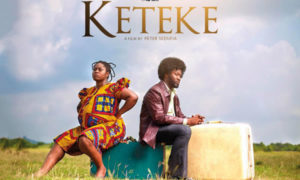 Peter Sedufia – Yes. His music was very familiar to me and his lyrics as well. I approached him when I finished writing the film.There were several versions and gradually, I transitioned from writer to director. It was at the fourth version that I contacted him to reflect on the approach together, a poetic introduction.
Peter Sedufia – Yes. His music was very familiar to me and his lyrics as well. I approached him when I finished writing the film.There were several versions and gradually, I transitioned from writer to director. It was at the fourth version that I contacted him to reflect on the approach together, a poetic introduction.
Olivier Barlet – The childbirth scene is very emotional, especially because of the singing that comes with it. How did you get to that result?
Peter Sedufia – I don’t know how to sing because I don’t have the voice for it, but I always have an idea of what I’m looking for. I was able to give him an idea of what I was looking for, so he would get the picture. I told the choir how I wanted the tempo to be, and so they went to write something for me. I wanted it to be very emotional, so they edited it and then we got what we wanted.
Alex Moussa Sawadogo – I would like to hear from producer Pedro Pimenta. How do you and the director choose a musician?
Pedro Pimenta – I have perhaps often had bad luck with directors who have not had a good musical ear. My method was therefore, during pre-production, to randomly ask the director for a musical reference. I also try to create multiple references, including images and editing, which truly helps when I work with the director. Often, we’re completely wrong because it’s necessary to say that, in my experience, musicians see the opportunity for an album. The director has to make choices, because the score cannot be held hostage by the composer, who really just wants to release an album. It is the producer’s role to find balance in everything, a sort of justice, at the financial level but also for recording and the studio, and in terms of respect. Everyone works differently. As Wasis said, I don’t know how I did it. It was done instinctively.
Olivier Barlet – Sound effects are essential to soundtracks. In The Mercy of the Jungle, you can hear the sounds the forest makes. They speak for themselves. They allow you to completely immerse yourself in this jungle, which is both fascinating and immensely terrifying. The composer is Line Adam.
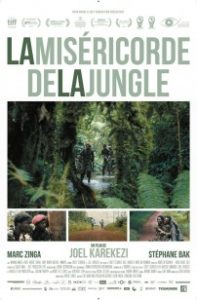 Joël Karekezi – Yes. She is Belgian and the singer, Nirere Shanel, is Rwandan. She also stars in the film. The jungle being a main character, we needed the soundtrack to be full of imagery, while also being a good choice for the music. Music was a huge problem for my first feature film, which I self-produced. We had no money, and I had to work with the composer through emails and Skype. Soundtrack makes your film. You just have to communicate what you truly want, but you also have to listen to the musicians because they have ideas too.
Joël Karekezi – Yes. She is Belgian and the singer, Nirere Shanel, is Rwandan. She also stars in the film. The jungle being a main character, we needed the soundtrack to be full of imagery, while also being a good choice for the music. Music was a huge problem for my first feature film, which I self-produced. We had no money, and I had to work with the composer through emails and Skype. Soundtrack makes your film. You just have to communicate what you truly want, but you also have to listen to the musicians because they have ideas too.
Alex Moussa Sawadogo – Tu travailles souvent avec des budgets très réduits. You often work on films with low budgets. Why not choose musicians from your own country, or music that already exists?
Joël Karekezi – You can’t always take the easy way out. There are a lot of very talented musicians in Rwanda, but the film is set in Congo. Everyone has heard their music before. I needed something that reflected the country, so I left it up to the composer. We needed the soundtrack to be original. It needed to speak to the audience. We had to write something new, especially because every scene is special in its own way.
Olivier Barlet – When I saw the film, I was struck by the diversity of the soundtrack. A very subtle guitar can emphasise something while still remaining extremely discreet. I even wondered if there wasn’t a bumblebee in the jungle. What is really interesting, is how the music takes over the image when the rebels attack the village. Had it been in a film such as Blood Diamond, it would have been a Hollywood song with a lot going on, but here it brings something cosmic. This directing choice creates distance from the image.
Joël Karekezi – This scene is very tough. I show intense scenes but I want the audience to be able to take it in. This is how I understood that I had to work with the composer and the sound engineer. Sometimes, it is the sound that has to take over. Some other times, it has to be the music.
Olivier Barlet – In this regard, Wasis Diop brings something almost cosmic to the films he has written a score for, such as Hyenas. Was it a reference for you?
Joël Karekezi – I got references from a lot of people. I listened. I looked at what other people had done. For instance, I really enjoyed The Thin Red Line, directed by Terrence Malick.
Alex Moussa Sawadogo – Wasis, you told me earlier than you believe the soundtrack to be a character in the film. Can you elaborate?
Wasis Diop – Music makes time go by faster. Music is always playing in bars and pubs, where can’t hear time go by. This character is there to make time go by faster. If you can say reason is dialogue, then emotion is music. There has to be balance between the two. The first feature films didn’t have sound, so they needed music to be meaningful. Because it was too difficult to add on film, they had to have musicians playing music live in the theatres. So naturally, that’s how music became part of cinema. It plays a very important part, it accompanies the film.
Alex Moussa Sawadogo – Peter, music is everywhere in Accra: in bars, pubs, restaurants… Is this what you use in your film?
Peter Sedufia – There are a lot of sounds in Accra. I could’ve used existing songs for the running sequences, but I wanted to use that familiarity while giving it something new so that people didn’t necessarily associate it with Ghana. It could come from South Africa, from Zimbabwe, or elsewhere. I wanted an original soundtrack, as much as a Ghanaian sountrack.
Alex Moussa Sawadogo – I have a question for Michel Zongo, who directed No Gold for Kalsaka. Instead of the music, you chose a narrator who is very well known in Burkina. Why?
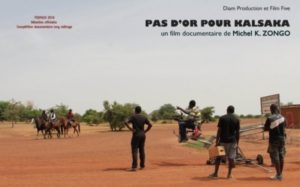 Michel K. Zongo – I don’t believe music to be necessary. This narrator works like a rumor in the streets of Kalsaka: things that were being told, things I could hear. We needed an impersonal voice, something that is greater than the city. However, there is western music in the film. I couldn’t dissociate gold exploitation, the gold rush and the western genre. We could’ve used music from films directed by Sergio Leone. We talked about it in pre-production. The producer introduced me to a German musician who had spent his childhood in Burkina, where he studied music. We really understood each other, so I let him do whatever he wanted, thinking that it could bring something interesting to the film. I didn’t want to dictate the music for him, I just wanted him to understand what I had in mind. He was based in Germany, so I sent him the first cut of the film. He saw it, and immediately understood what I was looking for. I also sent references of things I liked. It got more difficult in post-production because I had cut sound from the film. We had to create emotion that would feel natural. When you hear sound, you don’t necessarily need music. But at the same time, he wanted to create something mystic. We compromised. It was my first experience working with a musician, and it was amazing. I agree with Wasis: the soundtrack is a character.
Michel K. Zongo – I don’t believe music to be necessary. This narrator works like a rumor in the streets of Kalsaka: things that were being told, things I could hear. We needed an impersonal voice, something that is greater than the city. However, there is western music in the film. I couldn’t dissociate gold exploitation, the gold rush and the western genre. We could’ve used music from films directed by Sergio Leone. We talked about it in pre-production. The producer introduced me to a German musician who had spent his childhood in Burkina, where he studied music. We really understood each other, so I let him do whatever he wanted, thinking that it could bring something interesting to the film. I didn’t want to dictate the music for him, I just wanted him to understand what I had in mind. He was based in Germany, so I sent him the first cut of the film. He saw it, and immediately understood what I was looking for. I also sent references of things I liked. It got more difficult in post-production because I had cut sound from the film. We had to create emotion that would feel natural. When you hear sound, you don’t necessarily need music. But at the same time, he wanted to create something mystic. We compromised. It was my first experience working with a musician, and it was amazing. I agree with Wasis: the soundtrack is a character.
Discussion with the audience
Question : I don’t really understand when you speak of dissonance.
Wasis Diop – There is dissonance when there is uneasiness. You have to break the rules to create this uneasiness. It is about notes that don’t go together, like violins out of tune. Regarding music, too much novelty kills beauty. Cinema doesn’t need to be replaced. I would rather have a sequence without music, than a sequence accompanied by a soundtrack that is too beautiful, as if the sequence wasn’t enough. It doesn’t need it! It isn’t because a song is beautiful that it needs to be used.
Peter Sedufia – I want every sound to be heard independently. I want to hear the song of the train, the horn, and the music but I also want the train to be heard. It creates rhythm.
Question for Wasis Diop – How do you approach a documentary musically?
Wasis Diop – I made music for televised documentaries. The director asks for a song that he already has in mind. That’s what makes it difficult! Especially if the director is a musician himself. It is very rare for them to let you do what you want. If I was a director, and I had chosen a musician for my film, I would’ve let them compose it. I think I would be pleasantly surprised. The difficulty is that a director, in a general manner, is an author. You can’t put yourself in their shoes, and you don’t always understand what they want… To answer your question, when it comes to documentaries, directors usually ask for something. I wasn’t happy because I was only executing what they asked for.
Alex Moussa Sawadogo – Legally speaking, the author of a film is the director, the screenwriter and the composer. What do you think of that, Pedro?
Pedro Pimenta – It depends on the film… If you have a significant budget, you can work with a composer. If you don’t, you have to find existing songs and work things out with the artists. I was lucky enough to find a song for a documentary where they agreed to take the lyrics out. You have to sort things out!
Joël Karekezi – I self-produced Imbabazi, which means I didn’t have enough money to incorporate a song by Gaël Faye. I contacted him on Facebook, sent him the scene, and he let me use the song. We’ve been friends ever since. Indeed, you have to sort things out!
Peter Sedufia – Documentaries and fictions are very different. Documentaries do not need music as much as fiction films do because silence can be important. But it depends on the director, whether he wants to emphasise something emotionally.
Question – It is sometimes harder to use already-existing songs than to compose new ones. You sometimes have to deal with licensing when you least expect it, because you thought things had been dealt with already!
Peter Sedufia – That’s so true! For Keteke, I spent something like a thousand dollars to buy the song the main character listens to on the radio when the original songs we got for the film cost actually less than 500 dollars.
Wasis Diop – I wrote a song for André Téchiné, who put it in one of his films. The thing is, I didn’t realise the rhythm was very similar of that of Once in a Lifetime by Talking Heads. In the end, the song cost him ten times the budget of what he had planned for the soundtrack. And it was used in a very simple scene, at a hairdresser’s! You have to be very careful when picking out a song, because you never know who it might belong to.
Alex Moussa Sawadogo – Music is composed and then after is the object of an album. How does this happen?
Wasis Diop – There used to be a time where film scores sold very well. In the times of “worldmusic” we needed life, atmosphere in our houses! Music is also the history of civilization: everything depends on the period that we’re crossing. Universal Films sold albums. This is no longer the case today. But things have changed because everything is digital nowadays. We produce things one day, and it gets forgotten one week later. There you go, that’s where we’re at!
Alex Moussa Sawadogo – Michel, you filmed the rapper Smokey in a previous film and his music was then incorporated in his albums, isn’t that so?
Michel K. Zongo – It was strategic because one of my first documentaries was on a violinist: Sibi. I was put in contact with Smokey, who wasn’t well known at the time and not at all in the same style of music, but I wanted to see what that could give me. We went to the studio, he composed songs over the course of two days, and I filmed him. It was beautiful. I never said anything. I owned the rights to the songs because I had paid money for it, but I told him he could use them, reasoning to myself that it might help the film. I’m not a musical producer, and it could help my film. And it did! I also worked with him on The Siren of Faso Fani. I rarely use music in my documentary films, but the credits needed it. Because the film was politically-committed, he created something committed as well. We have this deal: I use the music for my film, and he owns the rights.
Olivier Barlet – Wasis once said in an interview : « I make panoramas with my music ». Cinema and music always merge together…
Wasis Diop – When we were talking about documentaries, I thought of animals. I love making wildlife documentaries. We have an extraordinary liberty, maybe because animals don’t judge you. We can really enter into this world that isn’t ours, the animal kingdom, completely new. I am captivated by it. It goes beyond musical understanding, it’s natural science. It’s a work of harmonisation, in reality. I have a lot of affection for animals.
Translated by Elise Ramaioli with collaboration of Madelyn Colvin from the text in french published on the Africultures website.
